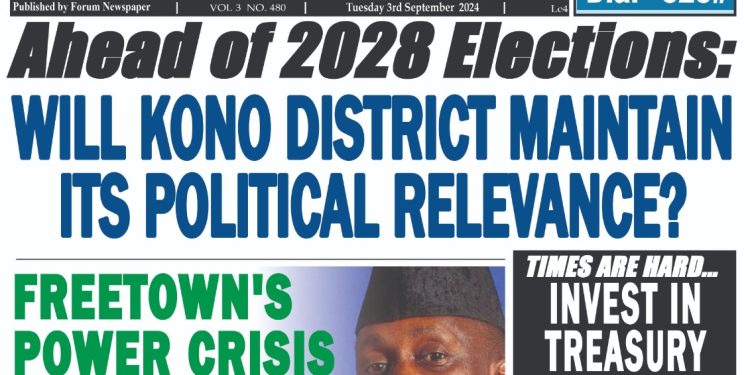By Cyllo Wise
Kono District, one of Sierra Leone’s most prominent and mineral-rich regions, has long held a significant place in the country’s political landscape. The district, known for its diamond wealth, has been a battleground for political parties seeking to consolidate power and influence in the region. Over the years, Kono has witnessed a dynamic political evolution, from being a stronghold of certain political factions to a more unpredictable and contested terrain. As Sierra Leone continues to grapple with various socio-political and economic challenges, the question arises: Will Kono District maintain its political relevance?
Kono District’s political relevance is deeply rooted in its historical and economic significance. Located in the Eastern Province of Sierra Leone, Kono is home to some of the world’s richest diamond deposits. The discovery of diamonds in the 1930s transformed the district into a hub of economic activity, attracting both local and international interest. The district’s wealth quickly became a focal point of political power struggles, as various factions sought to control the lucrative diamond trade.
During the colonial era, Kono’s diamonds were heavily exploited by the British colonial administration, which used the revenues to support the colonial government’s activities. The exploitation of Kono’s resources laid the groundwork for future conflicts over the district’s wealth, as various political and military actors sought to gain control over the diamond mines.
The post-independence period saw Kono District becoming a key battleground for Sierra Leone’s political parties. The All People’s Congress (APC), founded in 1960, quickly recognized the strategic importance of Kono’s diamonds and sought to establish a strong presence in the district. Under the leadership of Siaka Stevens, the APC used its control over the diamond mines to consolidate political power and maintain its dominance in national politics. Kono became a crucial stronghold for the APC, which relied on the district’s wealth to finance its political activities and maintain its grip on power.
The political relevance of Kono District took on a new dimension during Sierra Leone’s brutal civil war (1991-2002). The conflict, fueled by grievances over the country’s wealth distribution, saw Kono’s diamonds playing a central role in financing the war. The Revolutionary United Front (RUF), a rebel group that emerged in the early 1990s, targeted Kono’s diamond mines as a source of funding for its insurgency. The RUF’s control over the district’s diamond-rich areas allowed it to sustain its military campaign and prolong the conflict.
The civil war had a devastating impact on Kono District, leading to the displacement of thousands of residents and the destruction of infrastructure. The war also disrupted the district’s political dynamics, as traditional power structures were undermined by the violence and instability. However, the war also highlighted the strategic importance of Kono’s diamonds, reinforcing the district’s relevance in the broader political context of Sierra Leone.
Following the end of the civil war in 2002, Kono District began the slow process of recovery and reconstruction. The district’s diamond mines, once a source of conflict, became a focal point for post-war economic revitalization efforts. The government’s attempts to regulate the diamond industry and promote sustainable development in Kono were met with mixed results, as corruption and mismanagement continued to plague the sector.
Politically, Kono District underwent significant changes in the post-war period. The dominance of the APC in the district was challenged by the emergence of new political actors and the reconfiguration of the national political landscape. The Sierra Leone People’s Party (SLPP), which had been sidelined during the APC’s reign, sought to establish a foothold in Kono by appealing to the district’s war-weary population. The SLPP’s efforts to gain support in Kono were bolstered by the party’s focus on post-war reconstruction and development, which resonated with the district’s residents.
Kono District’s political landscape became increasingly competitive, with both the APC and SLPP vying for control over the district. The 2007 presidential and parliamentary elections marked a turning point in Kono’s political relevance, as the district emerged as a key swing region. The APC’s Ernest Bai Koroma, who eventually won the presidency, recognized the importance of securing Kono’s support and made significant efforts to court the district’s voters.
The subsequent elections in 2012 and 2018 further underscored Kono’s political relevance. The district’s voters demonstrated their ability to influence the outcome of national elections, with both the APC and SLPP intensifying their efforts to win over Kono’s electorate. The 2018 elections, in particular, saw Kono playing a decisive role in the election of President Julius Maada Bio, the SLPP candidate, who secured a significant portion of the district’s votes.
The political relevance of Kono District is inextricably linked to its economic significance. The district’s diamonds have been both a blessing and a curse, providing immense wealth while also fueling conflict and corruption. The post-war period has seen attempts to reform the diamond industry, with initiatives such as the Kimberley Process Certification Scheme aimed at curbing the trade in conflict diamonds and promoting transparency.
Despite these efforts, Kono’s diamond industry remains mired in challenges. Illegal mining, smuggling, and the exploitation of local miners continue to undermine the district’s economic potential. The failure to fully harness Kono’s diamond wealth for the benefit of its residents has contributed to ongoing poverty and underdevelopment in the district. This economic stagnation has had a direct impact on Kono’s political relevance, as the district’s residents increasingly demand accountability and tangible development outcomes from their leaders.
In recent years, there has been a growing recognition of the need to diversify Kono’s economy beyond diamonds. Agricultural development, infrastructure improvements, and investments in education and healthcare are seen as critical to the district’s long-term prosperity. The success or failure of these initiatives will play a significant role in shaping Kono’s political relevance in the coming years.
Traditional leaders, known as paramount chiefs, have historically played a central role in Kono District’s politics. These leaders wield significant influence over their communities and have often acted as intermediaries between the government and the local population. The paramount chiefs’ support has been crucial for political parties seeking to secure votes in Kono, and their endorsement can sway electoral outcomes.
However, the role of traditional leaders in Kono’s politics has not been without controversy. Accusations of corruption, favoritism, and political bias have tainted the reputation of some chiefs, leading to tensions between traditional authorities and the local population. The involvement of traditional leaders in partisan politics has also raised questions about their impartiality and the extent to which they truly represent the interests of their communities.
Civil society organizations (CSOs) in Kono have emerged as important actors in the district’s political landscape. These organizations, which include local NGOs, advocacy groups, and community-based organizations, have played a key role in promoting transparency, accountability, and good governance. CSOs in Kono have been instrumental in advocating for legal reforms, monitoring elections, and raising awareness about issues such as corruption and human rights abuses.
The growing influence of civil society in Kono’s politics reflects a broader trend of increased civic engagement in Sierra Leone. As residents of Kono become more politically aware and assertive, the district’s political relevance is likely to be shaped by the actions and demands of its civil society.
As Sierra Leone approaches its next electoral cycle, the question of whether Kono District will maintain its political relevance looms large. Several factors will determine the district’s future influence in the national political arena.
Kono District’s status as a swing region means that both the APC and SLPP will continue to prioritize the district in their electoral strategies. The outcome of future elections will depend on the ability of political parties to address the concerns and aspirations of Kono’s residents. Issues such as economic development, job creation, and improved public services will likely be at the forefront of the district’s political discourse.
Economic Development
The diversification of Kono’s economy will be critical to its long-term political relevance. If efforts to promote agriculture, infrastructure, and education are successful, Kono could become a model of sustainable development, further enhancing its political influence. Conversely, if the district’s economic challenges persist, there is a risk that Kono’s political relevance could diminish as residents grow disillusioned with the status quo.
The youth population in Kono, like in the rest of Sierra Leone, is large and growing. The political relevance of the district will increasingly depend on the engagement and mobilization of its young people. Political parties that can effectively connect with Kono’s youth, address their concerns, and offer opportunities for their future will likely gain significant support in the district.
Traditional Leaders and Civil Society
The role of traditional leaders and civil society in Kono’s politics will continue to be influential. Paramount chiefs who maintain the trust and respect of their communities will be key allies for political parties, while civil society organizations will play a crucial role in holding leaders accountable and advocating for reforms.
National Political Trends
Kono District’s political relevance will also be shaped by broader national trends, including shifts in party dynamics, governance challenges, and the overall political climate in Sierra Leone. As a microcosm of the country’s political landscape, Kono’s trajectory will reflect and influence the direction of national politics.
Kono District’s political relevance is a testament to its rich history, economic significance, and dynamic political landscape. As Sierra Leone faces ongoing challenges, Kono’s role as a key battleground for power and influence remains undeniable. The district’s future political relevance will be determined by its ability to navigate the complexities of economic diversification, youth engagement, and the evolving roles of traditional leaders and civil society. Whether Kono will continue to be a decisive force in shaping Sierra Leone’s political destiny will depend on the actions and aspirations of its people, and the ability of political leaders to respond to their demands for progress and development. As the nation looks ahead, Kono District stands at a crossroads, with its political relevance hanging in the balance, ready to either reinforce its legacy or redefine its place in Sierra Leone’s future.













